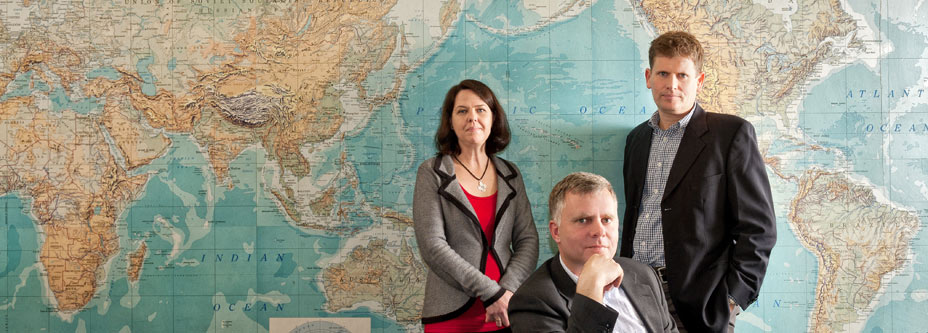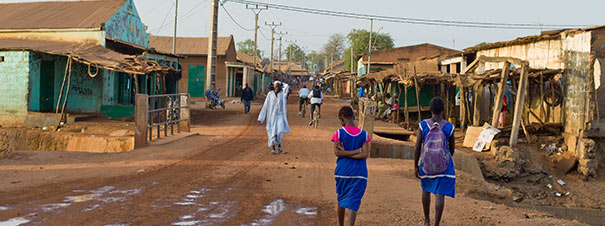
A world of difference
The University of Otago is strategically committed to its role as a good global citizen. The Centre for International Health contributes strongly to this, working to improve the health of people in developing countries.
In the 5½ years since the Centre for International Health was launched it has extended its influence from Dunedin out into the Asia-Pacific region.
Founding director Professor Philip Hill and more recently arrived co-director Professor John Crump already had well-established links in The Gambia and Tanzania respectively - links they have continued to foster.
But the focus is shifting increasingly towards Asia – including Indonesia and Myanmar – and the Pacific. The centre has been able to tap into Otago's special relationship with the National University of Samoa to conduct a population-based study of the prevalence of chlamydia which is being prepared for publication.
Hill says the Indonesian connection is well established and will be long-standing, enabling them to initiate tuberculosis (TB) research projects, obtain grant money and begin publishing.
"It has involved everything from public health to basic science. It's a special collaboration, involving Dutch colleagues from Nijmegen University, giving us links to be able to apply for European Union funding, which we have done successfully.
"We have two people on the ground there now. Ayesha Verrall who has an HRC [Health Research Council] clinical training fellowship for PhD research and Sue McAllister who is a research fellow working under an EU grant."
Dr Merrin Rutherford, who was the centre's junior research fellow in Indonesia from 2008 to 2012, has received her PhD through the Dutch collaboration and started medical school this year.
Much of the work focuses on TB case contacts – people who live in households where someone has TB, says Hill. "We want to understand what might cause them to get the disease, try to understand how to manage that optimally and, from a public health point of view, break through some of the barriers stopping this high-risk group being prevented from getting TB themselves.
"Also, on the basic science front, we want to understand why some contacts are more susceptible to developing TB disease than others. Is it the different strains, their immune system, or even their basic genetic make-up?"
The centre is involved in establishing new diagnostic tests and in dealing with multi-drug resistant TB in Bandung in Indonesia. Some of the research, which has recently been accepted for publication in the Bulletin of the World Health Organization, a major international public health journal, identified widespread gaps in the management of children in contact with TB cases.
A framework has been developed to identify the barriers to children being managed according to guidelines and it is intended to implement this framework at different sites around the world.
Hill's group is also playing a major part in European Commission-funded research into causative links between infectious and non-communicable diseases – in this case TB and diabetes mellitus (DM). The €6 million ($NZ9.5 million) study titled TANDEM (Tuberculosis and Diabetes ¬Mellitus) makes them part of a multidisciplinary consortium linking field sites in four TB-endemic countries experiencing rapid growth of DM – Romania, Peru, South Africa and Indonesia.
According to Hill, such developments fit with the basic concept of working together in partnership to compete for international funding and produce internationally competitive outputs while developing Indonesian researchers.
To address the shortage of genuinely internationally competitive Indonesian researchers, another new initiative has been developed – the Otago/Padjadjaran training fellow. Dr Raspati Koesoemadinata, the first fellow, is based in Indonesia and will complete an MSc in epidemiology by distance through the London School of Hygiene and Tropical Medicine. The long-term aim is for her to become a postdoctoral researcher able to compete internationally.
Developing researchers with an international focus is important and 15 postgraduate or BMedSc students have been, or are currently, linked to the centre.
Hill says they have also had fantastic extra support from Mercy Hospital in Dunedin through extra funding tor their Asia-Pacific work.
Vaccine surveillance

Early morning at Basse, inland Gambia, where the pneumoccocal surveillance programme is operating. (Photo: Philip Hill)
Hill remains strongly connected to research in The Gambia including the development of a pneumococcal vaccine surveillance system, funded by the Bill & Melinda Gates Foundation.
The final analysis is about to be completed of the first monitoring of the conjugate vaccine that has been introduced into West Africa.
"These vaccines cover only a certain proportion of the pneumococcal bacterium that causes a significant proportion of pneumonia globally. The concern is that other serotypes not covered will replace pneumococci of the vaccine serotype.
"We have observed in The Gambia that there is a significant replacement phenomenon which could negate the overall effectiveness of the vaccine." There are complicating factors, including the cost of adding extra serotypes to the vaccine and different predominating serotypes in different locations.
Gates Foundation Grand Challenges Explorations funding has also been awarded to a collaboration involving the centre and Dr Stephen Sowerby, director of the University's Applied Science Programme. This will evaluate a novel and portable fluid cell device for counting gastrointestinal worm eggs using digital images that can be sent electronically and analysed remotely.
Fighting fever
Research Crump leads in Tanzania has been in the news recently after a project supported by the US National Institutes of Health (NIH) found an extensive over-diagnosis of malaria.
"Obviously, if you're treated for malaria when you don't have it, you do worse than those patients who do have malaria because you are not getting the treatment you need. Our work can be summarised around trying to think about fever much more comprehensively than just malaria and working on what's causing all this other fever."
This has led to a particular focus on Crump's new NIH-funded research on zoonoses – infectious diseases such as leptospirosis that are transmitted between animals and humans.
"Zoonoses cause fever and, sometimes, severe illness in people, but also cause problems with fertility, growth and survival of livestock. So, the infections affect human health directly through the infection and indirectly through the loss of livestock production, and that's an area of research New Zealand is pretty good at."
He is also involved in a Gates Foundation-funded project on typhoid fever that is estimating its incidence in Africa to help policymakers decide whether typhoid vaccine should be more widely used.
There are now about 50 staff on these projects, including Tanzanian research fellows.
New collaborations
When Crump returned to Dunedin one of the goals was to develop a new institutional-level relationship between Otago and an institution in a less developed South-East Asian country.
Facilitated by the centre, the University of Otago has signed a collaborative agreement with the University of Medicine (1) in Yangon (formerly Rangoon), Myanmar. Seed funding has been obtained for small initial projects that will eventually lead to the ability to compete for larger grants together.
The first major grant application is currently with the Ministry of Foreign Affairs and Trade (MFAT) under its NZ Aid Programme Partnerships for the International Development Fund, designed to support the activities of existing partnerships of New Zealand institutions and those in developing countries.
This opens the way for an exchange of postgraduate students, including students from Yangon who can conduct their research on health problems relevant to their home country, and then return to contribute to the education and health sectors in Myanmar.
The Otago International Health Research Network aims to foster the idea that international health is multidisciplinary and crosses all University divisions and campuses.
For example, a PhD student from Myanmar, who is studying multi-drug-resistant tuberculosis, has been “linked” with Professor Greg Cook (Microbiology) who has expertise in that area, while Professor David Murdoch (Pathology, Christchurch) is involved in laboratory training.
But the collaborations run even wider, involving several other departments including Human Nutrition, Economics, Biochemistry and Geography. Dr Sarah Baird (Economics) and Erin Pennon (Preventive and Social Medicine) are examining the non-malaria fever issue to see whether it is cost-effective to introduce tests for bloodstream infections as part of diagnostic testing so that people receive more appropriate treatment.
"It is impossible to do the sort of work we do without interdisciplinary and international relationships," explains Crump. "Funders primarily want to find reliable ways of supporting work in low-resource areas that improves health and well-being, and look to us to add value based on our technical expertise.
"The idea is that we'll gradually build this relationship over time, focusing on the areas of our expertise. As trust grows and we get a track record of success, then we create the mechanism by which others wishing to apply their particular expertise to global health problems can plug in."
Setting up a service arm
Funding from the Dean's Strategic Development Fund totalling $100,000 over two years means the Centre for International Health can now develop a service arm.
Senior research fellow Dr Susan Jack, a former PhD student, worked in Cambodia for about 16 years and has experience with organisations such as WHO, World Bank and USAID which fund practical projects and evaluations.
"The establishment of this service arm allows us to focus some part of our work on those types of activity," says Hill.
"Very 'hands-on', practical types of people have a lot to offer so we wanted to see if we can host such an arm in the centre and provide a way for them to work in developing countries under our umbrella."
Both directors, and particularly Crump, have undertaken advisory work with WHO and other organisations, developing guidelines and working on how to best manage diseases.
Hill says aid-type funders are beginning to increasingly see the value of evaluation to prove health benefit of projects and the value of research tools in such evaluations.
"For example, USAID and NIH have recently combined in asking for proposals for operational research. This is exciting as it means that aid projects and research initiatives can link up, and Susan is ideally suited to developing this new arm to the centre."
